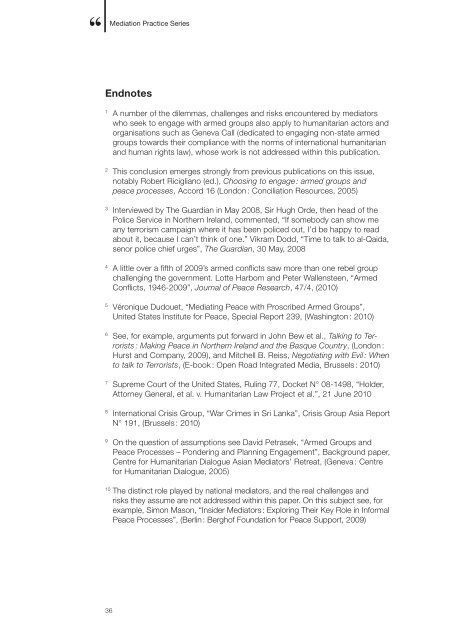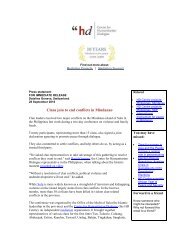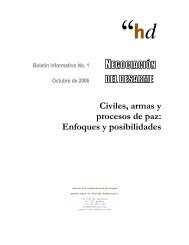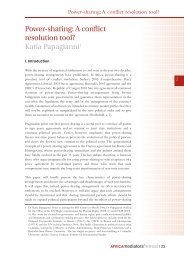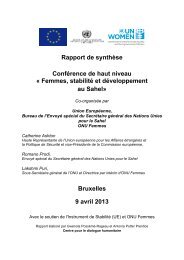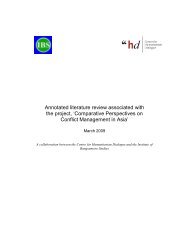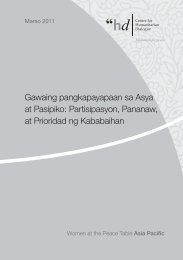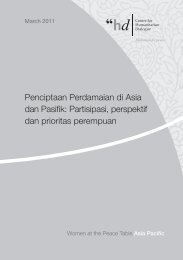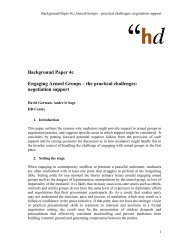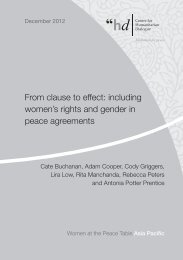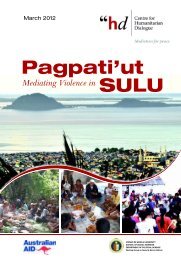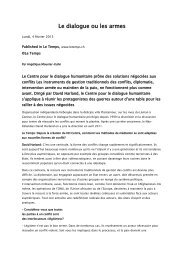Engaging with armed groups - Centre for Humanitarian Dialogue
Engaging with armed groups - Centre for Humanitarian Dialogue
Engaging with armed groups - Centre for Humanitarian Dialogue
- No tags were found...
Create successful ePaper yourself
Turn your PDF publications into a flip-book with our unique Google optimized e-Paper software.
Mediation Practice SeriesEndnotes1A number of the dilemmas, challenges and risks encountered by mediatorswho seek to engage <strong>with</strong> <strong>armed</strong> <strong>groups</strong> also apply to humanitarian actors andorganisations such as Geneva Call (dedicated to engaging non-state <strong>armed</strong><strong>groups</strong> towards their compliance <strong>with</strong> the norms of international humanitarianand human rights law), whose work is not addressed <strong>with</strong>in this publication.2This conclusion emerges strongly from previous publications on this issue,notably Robert Ricigliano (ed.), Choosing to engage : <strong>armed</strong> <strong>groups</strong> andpeace processes, Accord 16 (London : Conciliation Resources, 2005)3Interviewed by The Guardian in May 2008, Sir Hugh Orde, then head of thePolice Service in Northern Ireland, commented, “If somebody can show meany terrorism campaign where it has been policed out, I’d be happy to readabout it, because I can’t think of one.” Vikram Dodd, “Time to talk to al-Qaida,senor police chief urges”, The Guardian, 30 May, 20084A little over a fifth of 2009’s <strong>armed</strong> conflicts saw more than one rebel groupchallenging the government. Lotte Harbom and Peter Wallensteen, “ArmedConflicts, 1946-2009”, Journal of Peace Research, 47/4, (2010)5Véronique Dudouet, “Mediating Peace <strong>with</strong> Proscribed Armed Groups”,United States Institute <strong>for</strong> Peace, Special Report 239, (Washington : 2010)6See, <strong>for</strong> example, arguments put <strong>for</strong>ward in John Bew et al., Talking to Terrorists: Making Peace in Northern Ireland and the Basque Country, (London :Hurst and Company, 2009), and Mitchell B. Reiss, Negotiating <strong>with</strong> Evil : Whento talk to Terrorists, (E-book : Open Road Integrated Media, Brussels : 2010)7Supreme Court of the United States, Ruling 77, Docket N° 08-1498, “Holder,Attorney General, et al. v. <strong>Humanitarian</strong> Law Project et al.”, 21 June 20108International Crisis Group, “War Crimes in Sri Lanka”, Crisis Group Asia ReportN° 191, (Brussels : 2010)9On the question of assumptions see David Petrasek, “Armed Groups andPeace Processes – Pondering and Planning Engagement”, Background paper,<strong>Centre</strong> <strong>for</strong> <strong>Humanitarian</strong> <strong>Dialogue</strong> Asian Mediators’ Retreat, (Geneva : <strong>Centre</strong><strong>for</strong> <strong>Humanitarian</strong> <strong>Dialogue</strong>, 2005)10The distinct role played by national mediators, and the real challenges andrisks they assume are not addressed <strong>with</strong>in this paper. On this subject see, <strong>for</strong>example, Simon Mason, “Insider Mediators : Exploring Their Key Role in In<strong>for</strong>malPeace Processes”, (Berlin : Berghof Foundation <strong>for</strong> Peace Support, 2009)36


